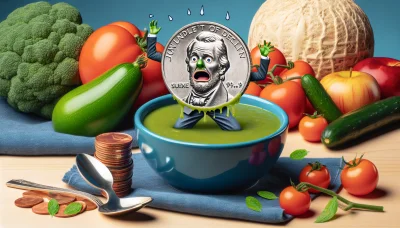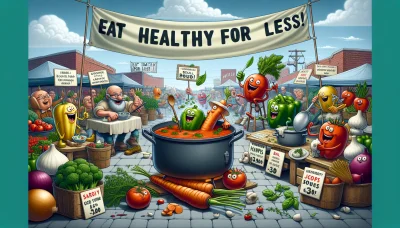What is hummus Quiz
Test Your Knowledge
Question of
What is Hummus?
Hummus is a popular Middle Eastern dip or spread made from cooked, mashed chickpeas blended with tahini, lemon juice, and garlic. Its origins can be traced back to ancient Egypt, and it has become a staple dish in many Middle Eastern and Mediterranean cuisines. The basic ingredients of hummus, primarily chickpeas and tahini, create a rich, creamy texture and a unique blend of flavors that have contributed to its widespread popularity around the globe.
The Nutritional Benefits of Hummus
Hummus is a delicious and nutritious spread made primarily from cooked, mashed chickpeas blended with tahini, olive oil, lemon juice, salt, and garlic. It's packed with a variety of essential nutrients beneficial for overall health. Rich in protein, hummus is an excellent choice for vegetarians and vegans looking to boost their protein intake. It also contains a good amount of dietary fiber, which aids in digestion and promotes a healthy gut. Hummus is a great source of heart-healthy fats, primarily due to the olive oil and tahini (sesame paste) it contains. These ingredients contribute to its content of monounsaturated and polyunsaturated fats, which can help to lower bad cholesterol levels and reduce the risk of heart disease. Additionally, hummus provides various vitamins and minerals, including iron, phosphorus, and B vitamins, which are crucial for energy production and overall bodily functions. Its antioxidant properties, attributed to ingredients like garlic and lemon juice, can further protect the body against inflammation and chronic diseases. Incorporating hummus into your diet can be a tasty and versatile way to enhance your nutritional intake while enjoying a range of health benefits.
How Hummus Fits into a Healthy Diet
- As a nutritious dip for vegetables such as carrots, cucumbers, and bell peppers.
- Spread on whole grain toast or crackers for a healthy snack.
- Used as a healthier alternative to mayonnaise in sandwiches and wraps.
- Incorporated into salad dressings for an extra protein boost.
- As a base for a savory breakfast bowl topped with poached eggs and greens.
- Mixed into pasta or grain salads for added flavor and nutrition.
- As a thickener in soups and stews for a creamy texture without heavy cream.
Different Ways to Enjoy Hummus
Hummus is a versatile and delicious spread that can enhance a wide variety of dishes and snacks. It's not just for dipping; hummus can be spread on sandwiches or wraps to add a creamy texture and rich flavor. It's also a fantastic addition to veggie platters, providing a hearty option for dipping carrots, celery, and other fresh vegetables. For a creative twist, try using hummus as a salad dressing or mix it into pasta for a Mediterranean-inspired dish. Don't forget about breakfast—hummus on toast topped with avocado or eggs can start your day off with a nutritious and satisfying meal. The possibilities with hummus are endless, making it a pantry staple for those who enjoy exploring new flavors and textures in their cooking.
Making Hummus at Home
Preparing hummus at home is surprisingly simple and requires only a few basic ingredients. This delightful and creamy dip has its origins in the Middle East and has gained worldwide popularity for its delicious flavor and health benefits. Making your own hummus not only allows you to adjust the flavors to your liking but also ensures that you're enjoying a fresh, preservative-free version. Let's dive into how you can make a basic hummus at home.
- 1 can (15 oz) of chickpeas, drained and rinsed
- 1/4 cup fresh lemon juice (about 1 large lemon)
- 1/4 cup well-stirred tahini
- 1 small garlic clove, minced
- 2 tablespoons extra virgin olive oil, plus more for serving
- 1/2 teaspoon ground cumin
- Salt to taste
- 2 to 3 tablespoons water
- Optional: Dash of ground paprika for serving
To prepare, simply combine all ingredients in a food processor and blend until smooth. Adjust the seasoning to taste and add more water if a thinner consistency is desired. Serve your hummus with a drizzle of olive oil and a sprinkle of paprika. Enjoy your homemade hummus with your favorite vegetables, crackers, or bread!
Store-Bought vs. Homemade Hummus
When it comes to hummus, the debate between store-bought and homemade versions is ongoing, with considerations of taste, nutrition, and convenience at the forefront. Store-bought hummus is known for its convenience and consistent quality, but it often contains preservatives and added sodium that can detract from its nutritional value. On the other hand, homemade hummus allows for complete control over ingredients, enabling a reduction in sodium and the elimination of preservatives, which can make it a healthier option. Taste-wise, homemade hummus often has a fresher flavor, with the ability to adjust ingredients to personal preference, while store-bought varieties offer a wide range of flavors that might be difficult to replicate at home. Ultimately, the choice between store-bought and homemade hummus comes down to a balance of convenience, health considerations, and personal taste preferences.
Conclusion: The Role of Hummus in Healthy Eating
Hummus plays a pivotal role in promoting a balanced diet due to its nutrient-rich profile, offering a good source of protein, fiber, and essential vitamins and minerals. Its versatility makes it a valuable addition to various meals, from being a simple dip to a base for more complex dishes. Embracing hummus in daily consumption can contribute significantly to maintaining a healthy lifestyle, encouraging diverse and nutritious eating habits.












